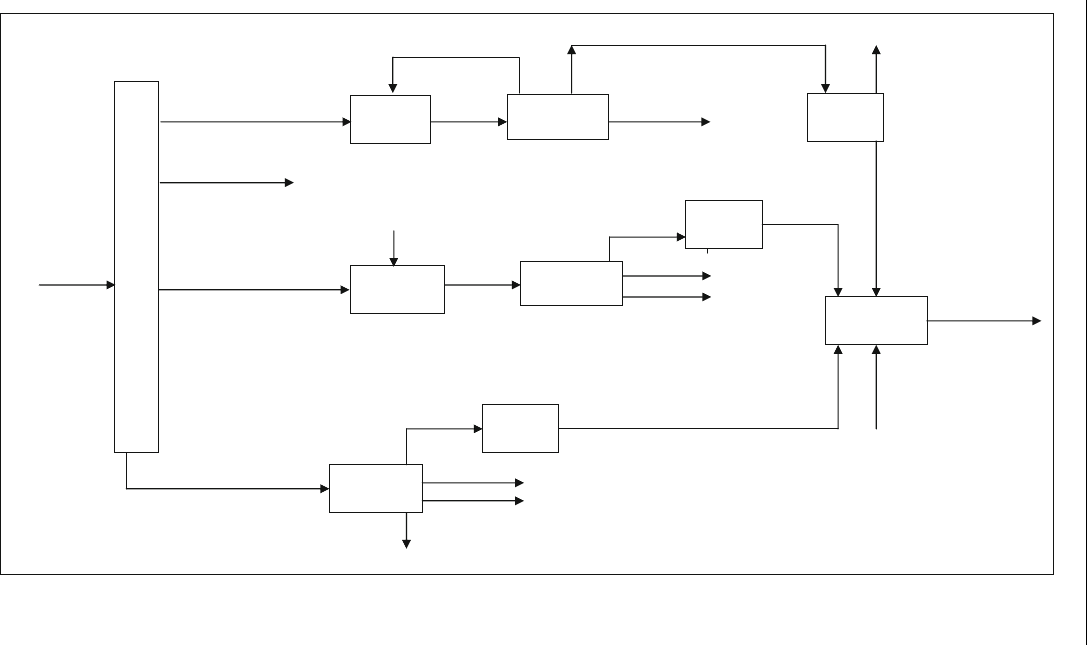Fahim M.A., Sahhaf T.A., Elkilani A.S. Fundamentals of Petroleum Refining
Подождите немного. Документ загружается.


CHAPTER EIGHTEEN
Overall Refinery Case Study
18.1. Introduction
In this chapter, a typical case study is taken to consider most of the
CDU product streams into more process downstreams such as reformer,
fluid catalytic cracking, delayed coker and alkylation. Hydroprocessing is
mainly used to remove sulphur to meet the market product specifications.
The capacity of a crude distillation unit (CDU) is 100,000 barrels per
stream day (BPSD). The unit produces raw products, which have to be
processed in the downstream unit to produce products of a certain specifi-
cation. This involves the removal of undesirable components like sulphur,
nitrogen and metal compounds, and limiting the aromatic content. Typical
products from the CDU are:
Gases
Light straight run naphtha (also called light gasoline, light naphtha)
Heavy gasoline (also called military jet fuel)
Kerosene (also called light distillate or jet fuel)
Middle distillates called diesel or light gas oil (LGO)
Heavy distillates called atmospheric gas oil (AGO) or heavy gas oil
(HGO)
Crude column bottoms called atmospheric residue or topped crude
18.2. The Case Study
In this case study 100,000 BPD crude oil, with an API of 26, is introduced
to a distillation column. The produced naphtha cut (190–380
F) is hydro-
treated to remove sulphur and then fed to a reformer to produce a C
þ
5
cut of 94
RON. The produced hydrogen in the reformer is used in the hydrotreater units.
The gas oil cut (580–650
F) is hydrotreated to remove sulphur and then
fed to the FCC unit of 75% conversion to produce gasoline, gases, gas oil and
coke. Fluidized catalytic cracking (FCC) is the heart of the refinery and is
where heavy, low value petroleum streams are upgraded into lighter products
Fundamentals of Petroleum Refining
#
2010 Elsevier B.V.
DOI: 10.1016/ B978-0-444-52785-1.00020-6 All rights reserved.
457

mainly gasoline and C
3
/C
4
olefins, which can be used in the alkylation unit to
produce ultra-clean gasoline (C
7
–C
8
alkylates).
The residue cut (1050þ
F) produced from the CDU is fed to a delayed
coker unit to produce gasoline, gases, gas oil and coke. Coking is the process
of carbon rejection from the heavy residues producing lighter components
lower in sulphur, since most of the sulphur is retained in the coke.
Gas streams are split to separate isobutane (iC
4
) and butene (C
¼
4
)fromother
gases. iC
4
and C
¼
4
are fed to an alkylation unit with an addition of make-up iC
4
to produce alkylate. Alkylation is the process of producing gasoline range
material (alkylates) from olefin butylenes (C
¼
4
) and isobutane. Butylene is the
most used olefin because of the high quality of the alkylate produced.
The typical flow chart of the full process is shown in Figure 18.1. The
crude TBP-vol% analysis is shown in Table 18.1.
The crude TBP and API as a function of accumulated liquid volume %
(LV%) are calculated as follows:
TBPð
RÞ¼ 2:2ln
100
100 LV%
2:7
þ 1
()
490 ð18:1Þ
API ¼0:0004ðLV%Þ
3
þ 0:05ðLV%Þ
2
2:4ðLV%Þþ80 ð18:2Þ
Material balance and property calculations are performed for each product
streams using the methods outlined in Chapter 3 to 8 and 10. The details are as
follows:
Considering the crude distillation unit:
190–380
F cut
Substituting in equation (18.1) to get LV% at IBP and EBP
Cut vol% ¼ 33:05 25:92 ¼ 7:134%
Cut mid volume ¼ 29:485
Substituting the cut mid volume in equation (18.2) to get API ¼ 42.45
Cut volume ¼ 0:07134ð100; 000Þ¼7134 BPD
Cut amount ¼ 7134ð11:87Þ¼84; 681 lb=h
Calculation of sulphur content:
M ¼ 42:965½expð2:097 10
4
T
b
7:78712 SG þ 2:08476
10
3
T
b
SGÞT
1:26007
b
SG
4:98308
T
b
¼ðð190 þ 380Þ=2 32Þ=1:8 þ 273 ¼ 413 K
SG ¼ 0:812
M ¼ 109 lb=lb mol
458 Chapter 18

LCO
Crude Distillation
Hydro-
Treater
Reformer
Hydro-
Treater
190-380 °F
580-650 °F
HN
H
2
Delayed
Coker
1050+ °F
12% CCR
100,000 BPD
Crude
FCC
75% Conv
Coke
Gases
Gasoline
Gasoil
Gasoil
Gasoline
Gases
H
2
Gases
C
5
+ RON = 94
Alkylation
Split
Reform
iC4
Gases
Split
FCC
iC4
C4=
Split
Coker
iC4
C4=
Alkylate
Makeup
iC4
380-580 °F
HCO
API = 50
Figure 18.1 Process flow chart
Overall Refinery Case Study 459

I ¼ 2:266 10
2
expð3:905 10
4
T
b
þ 2:468SG 5:704
10
4
T
b
SGÞT
0:0572
b
SG
0:72
¼ 0:2632
n ¼
1 þ 2I
1 I
1=2
¼ 1:439
R
i
¼ n
d
2
¼ 1:033
m ¼ Mðn 1:475Þ¼3:924
since M < 200
sulphur wt% ¼ 177:448 170:946 R
i
þ0:2258 m þ4:054 SG ¼ 1:36 wt%
sulphur amount ¼ 0:0136ð84; 681Þ¼1152 lb=h
580–650
F cut
Substituting in equation (18.1) to get LV% at IBP and EBP
Cut vol% ¼ 39:1 37:77 ¼ 1:33%
Cut mid volume ¼ 38:435
Substituting the cut mid volume in equation (18.2) to get API ¼ 30.0
Cut volume ¼ 0:0133ð100; 000Þ¼1330 BPD
Cut amount ¼ 1330ð12:77Þ¼16; 984 lb=h
Table 18.1 TBP-vol% analysis
Fraction No. Cut temp. (
F) vol% SG
0 86 0.0
1 122 0.5 0.6700
2 167 1.2 0.6750
3 212 1.6 0.7220
4 257 2.7 0.7480
5 302 3.1 0.7650
6 347 3.9 0.7780
7 392 4.7 0.7890
8 437 5.7 0.8010
9 482 8.0 0.8140
10 527 10.7 0.8250
11 584 5.0 0.8450
12 636 10.0 0.8540
13 689 7.8 0.8630
14 742 7.0 0.8640
15 794 6.5 0.8890
Residuum – 20.8 0.9310
460 Chapter 18

Calculation of sulphur content:
M ¼ 42:965½expð2:097 10
4
T
b
7:78712 SG þ2:08476 10
3
T
b
SGÞ
T
1:26007
b
SG
4:98308
T
b
¼ðð580 þ 650Þ=2 32Þ=1:8 þ 273 ¼ 597 K
SG ¼ 0:83
M ¼ 265lb=lb mol
I ¼ 2:266 10
2
expð3:905 10
4
T
b
þ 2:468SG 5:704 10
4
T
b
SGÞ
T
0:0572
b
SG
0:72
¼ 0:2757
n ¼
1 þ 2I
1 I
1=2
¼ 1:4635
R
i
¼ n
d
2
¼ 1:0485
m ¼ Mðn 1:475Þ¼3:0475
since M > 200
sulphur wt% ¼58:02 þ 38:463 R
i
0:023 m þ 22:4SG¼ 3:3wt%
sulphur amount ¼ 0:033ð16; 984Þ¼560:5lb=h
Considering the naphtha hydrotreater unit:
K ¼
ðT
b
Þ
1=3
SG
¼
190 þ 380
2
þ 460
1=3
0:812
¼ 11:164
SCFB H
2
¼ 191S
f
30:7 ¼ 191ð1:36Þ30:7 ¼ 229:06 SCFB
Since the feed is 7134 BPD:
Required hydrogen is 359.3 lb/h
DAPI
p
¼ 0:01ðSCFB H
2
Þþ0:036ðAPI
f
Þ2:69 ¼ 1:1288
API
p
¼ 42:45 þ 1:1288 ¼ 43:58
Parrafin vol% ¼ 12:8K
2
f
229:5 K
f
þ 1330 ¼ 28:27
Naphthenes vol% ¼78:5K
2
f
þ 1776:6K
f
9993: 7 ¼ 56:42
Aromatics vol% ¼ 38:4K
2
f
894:3K
f
þ 5219:4 ¼ 21:414
Normalizing : P vol% ¼ 26:64; N vol% ¼ 53:8; A vol% ¼ 20:18
Overall Refinery Case Study 461

Considering the reformer unit:
Reformer feed ¼ 7134 BPD
API ¼ 43:58
Amount of feed to reformer ¼ 7134ð11:79Þ¼84; 110 lb=h
C
þ
5
vol% ¼ 142:7914 0:77033 RON
R
þ 0:219122 ðN þ 2AÞ
F
¼ 142:7914 0:77033 97 þ 0:219122 ð53:8 þ 2ð20:18ÞÞ
¼ 90:876
H
2
wt% ¼12:1641 þ0:06134 C
þ
5
vol% þ0:099482 RON
R
¼2:76
C
1
wt% ¼11:509 0:125 C
þ
5
vol% ¼0:1495
C
2
wt% ¼16:496 0:1758 C
þ
5
vol% ¼ 0:52
C
3
wt% ¼24:209 0:2565 C
þ
5
vol% ¼ 0:9
C
4
wt% ¼27:024 0:2837 C
þ
5
vol% ¼ 1:243
nC
4
wt% ¼0:585 total C
4
wt% ¼0:727
iC
4
wt% ¼0:415 total C
4
wt% ¼0:516
Hydrogen produced ¼ 0.0276 (84,110) ¼ 2321 lb/h > 359.3 lb/h, this
means that the hydrogen produced in the reformer is more than the
required hydrogen in the hydrotreating reformer feed.
Considering the gas oil hydrotreater unit:
Middle distillate HT
SCFB H
2
¼ 110:8 S
f
þ 10:2ðHDS%Þ659
Assume 100% severity of the hydrotreater
SCFB H
2
¼ 110:8ð3:3Þþ10:2ð100Þ659 ¼ 726:64 SCFB
Since the feed is 1330 BPD:
Amount of H
2
required ¼ 212.5 lb/h (This can be supplied from the
reformer unit.)
DAPI
p
¼ 0:00297ðSCFB H
2
Þ0:11205ðAPI
f
Þþ5:5419 ¼ 4:3385
API
p
¼ 30 þ 4:3385 ¼ 34:3385
Feed to FCC ¼ 1330ð12:45Þ¼16; 559 lb=h
Considering the FCC unit:
Conversion ¼ 75%
462 Chapter 18

Coke wt% ¼ 0:05356 CONV 0:18598 API þ 5:966975 ¼ 3:5977
LCO LV ¼ 0:0047 CONV
2
0:8564 CONV þ 53:576 ¼ 15:7835
Gases wt% ¼ 0:0552 CONV þ 0:597 ¼ 4:737
Gasoline LV% ¼ 0:7754 CONV 0:7778 ¼ 57:3772
iC
4
LV% ¼ 0:0007 CONV
2
þ 0:0047 CONV þ 1:40524 ¼ 5:7
nC
4
LV% ¼ 0:0002 CONV
2
þ 0:019 CONV þ 0:0476 ¼ 2:6
C
¼
4
LV% ¼ 0:0993 CONV 0:1556 ¼ 7:3
C
3
LV% ¼ 0:0436 CONV 0:8714 ¼ 2:4
C
¼
3
LV% ¼ 0:0003 CONV
2
þ 0:0633 CONV þ 0:0143 ¼ 6:45
Gasoline API ¼0:19028 CONV þ 0:02772 ðGasoline LV%Þ
þ64:08 ¼ 51:4
LCO API ¼0:34661 CONV þ 1:725715 ðFeed APIÞ¼33:26
Products BPD (lb/h)/ BPD lb/h
Gases 784.4
iC
4
75.81 8.22 623.2
nC
4
34.58 8.51 294.3
C
¼
4
97.1 8.76 850.5
C
3
31.9 7.42 237
C
¼
3
85.8 7.61 653
Gasoline 763 11.29 8614.3
LCO 210 12.53 2631.2
HCO 1275.3
Coke 595.7
1050þ
F cut
Substituting in equation (18.1) to get LV% at IBP and EBP
Cut vol% ¼ 100 44:9 ¼ 55:1%
Cut mid volume ¼ 72:45
Substituting the cut mid volume in equation (18.2) to get API ¼ 16.45
Overall Refinery Case Study 463

Cut volume ¼ 0:551ð100; 000Þ¼55; 100 BPD
Cut amount ¼ 55; 100ð13:96Þ¼769; 196 lb=h
Considering the delayed coker unit:
GasðC
4
Þwt% ¼ 7:8 þ 0:144 ðwt% CCRÞ¼9:528
Naphtha wt% ¼ 11:29 þ 0:343 ðwt% CCRÞ¼15:406
Coke wt% ¼ 1:6 ðwt% CCR%Þ¼19:2
Gas oil wt% ¼ 100 wt% Gas wt% Napthta wt% Coke ¼ 55:866
Amount of gases produced ¼ 0:09528ð769; 196Þ¼73; 289lb=h
Assume the average molecular weight for the gases is 22.12 lb/lb mol
Gases ¼ 73; 289=22:12 ¼ 3313 lbmol=h
C
¼
4
¼ 0:024ð3313Þð56Þ¼4453 lb =h
iC
4
¼ 0:01ð3313Þð58Þ¼1922 lb=h
nC
4
¼ 0:026ð3313Þð58Þ¼4996 lb=h
Considering the alkylation unit:
Amount of olefins ¼ C
¼
4
coker þ C
¼
4
FCC
¼ 4453 þ 850:5 ¼ 53035 lb=h
Amount of iC
4
¼ iC
4
coker þ iC
4
FCC þ iC
4
Reformer
¼ 1922 þ 623:2 þ 611: 5 ¼ 3156:71 b=h
lbiC
4
lb olefin
¼ 1:1256
Required iC
4
¼ 1:1256ð5303:5Þ¼5969:6lb=h
Makeup iC
4
¼ 5969:6 3156:7 ¼ 2813 lb=h
BPD olefin ¼ 5303:5=8:76 ¼ 605:42 BPD
BPDi C
4
¼ 5969:6=8:22 ¼ 726:23 BPD
Total feed to alkylation ¼ 605:42 þ 726:23 ¼ 1331:65 BPD
Volume of product ¼ 1331:65=1:2 ¼ 1109:71 BPD
Alkylate amount produced ¼ 0:8236ð1109:71Þ¼914 BPD
Summary of the case:
Total gasoline produced ¼Coker gasoline þFCC gasoline þreformer gasoline
¼0:15406ð769;196Þþ8614:3 þ0:90876ð7134Þð11:37Þ
¼118;502 þ8614:3 þ73; 712:7
¼200;829 lb=h
464 Chapter 18

Appendix B
B. Definition of Terms
Absorption The disappearance of one substance into another so that the
absorbed substance loses its identifying characteristics, while
the absorbing substance retains most of its original physical
aspects. Used in refining to selectively remove specific com-
ponents from process streams.
Acid treatment A process in which unfinished petroleum products, such as
gasoline, kerosene and lubricating oil stocks, are treated with
sulphuric acid to improve color, odour and other properties.
Adsorption Adhesion of the molecules of gases or liquids to the surface of
solid materials.
Aliphatic hydrocarbon Hydrocarbons characterized by open-chain structures: eth-
ane, butane, butene, acetylene, and so on.
Alkylation A process using sulphuric or hydrofluoric acid as a catalyst to
combine olefins (usually butylene) and isobutane to produce
a high-octane product known as alkylate.
Aniline point The minimum temperature for complete miscibility of equal
volumes of aniline and a test sample. This test is an indication
of paraffinicity and the ignition quality of diesel.
API gravity An arbitrary scale expressing the density of petroleum
products.
Aromatics Hydrocarbon compound that contains atleast one benzene ring.
Asphaltenes The asphalt compounds soluble in carbon disulphide but
insoluble in paraffin naphthas.
ASTM distillation A standardized laboratory batch distillation for naphthas and
middle distillate at atmospheric pressure.
Atmospheric tower A distillation unit operated at atmospheric pressure.
Benzene An unsaturated, six-carbon ring, basic aromatic compound.
Blending The process of mixing two or more petroleum products with
different properties to produce a finished product with
desired characteristics.
Blowdown The removal of hydrocarbons from a process unit, vessel or
line on a scheduled or emergency basis by the use of pressure
through special piping and drums provided for this purpose.
Fundamentals of Petroleum Refining
#
2010 Elsevier B.V.
DOI: 10.1016/ B978-0-444-52785-1.00028-0 All rights reserved.
469

Boiling range The range of temperature (usually at atmospheric pressure) at
which the boiling (or distillation) of a hydrocarbon liquid
commences, proceeds and finishes.
Bottoms Tower bottoms are residues remaining in a distillation unit
after the highest boiling point material to be distilled has
been removed. Tank bottoms are the heavy materials that
accumulate in the bottom of storage tanks, usually comprised
of oil, water and foreign matter.
Catalyst A material that aids or promotes a chemical reaction between
other substances but does not react itself. Catalysts increase
reaction speeds and can provide control by increasing desir-
able reactions and decreasing undesirable reactions.
Catalytic cracking The process of breaking up heavier hydrocarbon molecules
into lighter hydrocarbon fractions by use of heat and catalysts.
Caustic wash A process in which distillate is treated with sodium hydroxide
to remove acidic contaminants that contribute to poor odour
and stability.
Cetane number The percentage of pure cetane in a blend of cetane and alpha
methyl naphthalene which matches the ignition quality of a
diesel fuel sample.
Coke A high carbon-content residue remaining from the destruc-
tive distillation of petroleum residue.
Coking A process for thermally converting and upgrading heavy
residual into lighter products and by-product petroleum
coke. Coking is also the removal of all lighter distillable
hydrocarbons that leave a residue of carbon in the bottom
of units or as build-up or deposits on equipment and catalysts.
Condensate The liquid hydrocarbon resulting from cooling vapours.
Conradson carbon A test used to determine the amount of carbon residue left
after the evaporation and pyrolysis of an oil under specified
conditions.
Cracking The breaking up of heavy molecular weight hydrocarbons
into lighter hydrocarbon molecules by the application of heat
and pressure with or without the use of catalysts.
Crude assay A procedure for determining the general distillation and
quality characteristics of crude oil.
Crude oil A naturally occurring mixture of hydrocarbons that usually
includes small quantities of sulphur, nitrogen and oxygen
derivatives of hydrocarbons as well as trace metals.
Cycle gas oil Cracked gas oil returned to a cracking unit.
Deasphalting Process of removing asphaltic materials from reduced crude
using liquid propane to dissolve non-asphaltic compounds.
Debutanizer A fractionating column used to remove butane and lighter
components from liquid streams.
470 Appendix B
